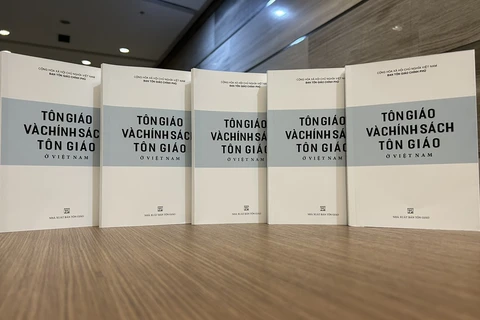HCM City (VNA) - Ten years after its enforcement, many contents of the 2013 Constitution have proved to be consistent with the objective reality and international law, heard a symposium held by the Ho Chi Minh City University of Law on October 16.
Nguyen Mai Anh, lecturer at the Faculty of State and Administrative Law, emphasised that this is the first Constitution to officially set a principle on the restriction of human rights. Clause 2, Article 14 stipulates that “Human rights and citizen rights can only be limited in accordance with the provisions of law in necessary cases for reasons of national defence and security, social order and safety, social ethics, and public health."
This principle has become a “lodestar” that impacts all other regulations in the Constitution and is the most important legal basis for institutionalising the contents related to restricting human rights and citizen rights in specialised laws in Vietnam at present, she stated.
According to Anh, in international law, among the reasons to limit fundamental rights, “protection of public order” is one of the most popular grounds. The lecturer said that Article 29 of the Universal Declaration of Human Rights stipulates “In the exercise of his rights and freedoms, everyone shall be subject only to such limitations as are determined by law solely for the purpose of securing due recognition and respect for the rights and freedoms of others and of meeting the just requirements of morality, public order and the general welfare in a democratic society”. As such, the stipulation in Vietnam's 2013 Constitution is compatible to international law and suits reality.
The official recognition of the principle in the 2013 Constitution not only affirms the Party and State's guidelines and policies in ensuring human rights but also sets a legal framework for State agencies when restricting individuals’ rights in special cases, she added.
Prof. Dr. Tran Ngoc Duong, former deputy head of the National Assembly Office, said that the 2013 Constitution for the first time constitutionalised the issue of controlling State power. Accordingly, State power, in addition to assignment and coordination, also contains the mutual control among agencies in the exercise of legislative, executive and judicial rights.
According to him, in order for State power to be effectively controlled, it is necessary to continue improving the mechanism to control State power, considering it a core goal in the process of building and perfecting a rule-of-law socialist state in the new stage./.
Nguyen Mai Anh, lecturer at the Faculty of State and Administrative Law, emphasised that this is the first Constitution to officially set a principle on the restriction of human rights. Clause 2, Article 14 stipulates that “Human rights and citizen rights can only be limited in accordance with the provisions of law in necessary cases for reasons of national defence and security, social order and safety, social ethics, and public health."
This principle has become a “lodestar” that impacts all other regulations in the Constitution and is the most important legal basis for institutionalising the contents related to restricting human rights and citizen rights in specialised laws in Vietnam at present, she stated.
According to Anh, in international law, among the reasons to limit fundamental rights, “protection of public order” is one of the most popular grounds. The lecturer said that Article 29 of the Universal Declaration of Human Rights stipulates “In the exercise of his rights and freedoms, everyone shall be subject only to such limitations as are determined by law solely for the purpose of securing due recognition and respect for the rights and freedoms of others and of meeting the just requirements of morality, public order and the general welfare in a democratic society”. As such, the stipulation in Vietnam's 2013 Constitution is compatible to international law and suits reality.
The official recognition of the principle in the 2013 Constitution not only affirms the Party and State's guidelines and policies in ensuring human rights but also sets a legal framework for State agencies when restricting individuals’ rights in special cases, she added.
Prof. Dr. Tran Ngoc Duong, former deputy head of the National Assembly Office, said that the 2013 Constitution for the first time constitutionalised the issue of controlling State power. Accordingly, State power, in addition to assignment and coordination, also contains the mutual control among agencies in the exercise of legislative, executive and judicial rights.
According to him, in order for State power to be effectively controlled, it is necessary to continue improving the mechanism to control State power, considering it a core goal in the process of building and perfecting a rule-of-law socialist state in the new stage./.
VNA























